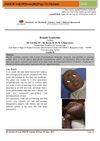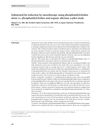Search
forProducts matching "soy proteins"
Tracking 2 products like 191 Toby Horsetail Supplement and 384 Folligen Treatment from by companies like ZeeMoreUncle and Dr.FORHAIR. View all 2 products »
Sort by
Research
270-300 / 364 resultsresearch Phytoestrogens and Early Onset Androgenic Alopecia: A Study in Ndola, Zambia
Eating a lot of soy might lower the chance of early hair loss in men likely to get it.
research Hair Loss in Older Women: Supplement to Increase Scalp Hair Thickness and Reduce Hair Loss
The supplement reduces hair loss and increases hair thickness in older women.
research Biotin Deficiency in an Infant Fed with Amino Acid Formula and Hypoallergenic Rice
Biotin should be added to Japanese amino acid formula to prevent deficiency.

research Brandt Syndrome: Case of Periorificial Dermatitis, Alopecia, and Diarrhea in Infants Fed Soy Milk
Brandt syndrome, with symptoms like skin rash, hair loss, and diarrhea, improves quickly with zinc supplements.

research Supplementary 2: Compilation of Scientific Studies and Reviews
The document discusses various topics including the use of plant derivatives for hair loss, potential food additives, antioxidant properties of different extracts, and the study of bacteria on stainless steel surfaces.
research Soymilk Reduces Hair Growth And Hair Follicle Dimensions
Soymilk can slow hair growth and make hair thinner.

research Penetration Enhancer-Containing Vesicles as Carriers for Cutaneous Delivery of Minoxidil
PEVs improve minoxidil skin penetration, increasing hair growth.

research Improvement in Physicochemical Parameters of DPPC Liposomes and Increase in Skin Permeation of Aciclovir and Minoxidil by the Addition of Cationic Polymers
Cationic polymers improved liposome stability and increased skin absorption of aciclovir and minoxidil.

research Transcutol-Containing Vesicles for Topical Delivery of Minoxidil
Transcutol-containing vesicles improve minoxidil's skin penetration and hair growth promotion.

research Penetration Enhancer-Containing Vesicles as Carriers for Cutaneous Delivery of Minoxidil: In Vitro Evaluation of Drug Permeation by Infrared Spectroscopy
PEVs effectively deliver minoxidil through skin.

research Severity of Androgenetic Alopecia Associated with Poor Sleeping Habits and Carnivorous Eating and Junk Food Consumption—A Web-Based Investigation of Male Pattern Hair Loss in China
Poor sleep, meat-heavy diets, and junk food worsen hair loss, while sugary drinks may help.

research A Hair Growth-Promoting Effect of Chinese Black Tea Extract in Mice
Chinese black tea extract helped mice grow hair, especially when combined with capsaicin.

research Essential Fatty Acid Deficiency in a Patient with Vascular Ehlers-Danlos Syndrome
A patient with Ehlers-Danlos Syndrome improved after treatment for fat malabsorption and essential fatty acid deficiency.

research The North American Menopause Society Recommendations for Clinical Care of Midlife Women
The NAMS 2014 recommendations guide healthcare providers on treating health issues in midlife women, emphasizing individualized care and informed decision-making.

research The Agouti Mouse Model: An Epigenetic Biosensor for Nutritional and Environmental Alterations on the Fetal Epigenome
Diet changes can protect against harmful environmental effects on fetal development.

research Side Effects of Androgen Deprivation Therapy: Monitoring and Minimizing Toxicity
Androgen deprivation therapy for prostate cancer can cause sexual, physical, and psychological side effects, and doctors should manage these carefully.

research Acute Hepatitis Due to Shen-Min
Shen-Min, a hair growth supplement, likely caused acute hepatitis in a woman, improving after she stopped taking it.

research Alopecia Areata: An Update
The document concludes that alopecia areata is an autoimmune disease without a definitive cure, but treatments like corticosteroids are commonly used.

research Bioengineered Plants as a Source of Omega-3 Fatty Acids
Genetically modified plants could be an important source of omega-3 fats to meet global needs.

research Anti-MRSA Malleable Liposomes Carrying Chloramphenicol for Ameliorating Hair Follicle Targeting
DA liposomes with chloramphenicol effectively target hair follicles and combat MRSA with minimal skin toxicity.

research Testosterone Is a Contraceptive and Should Not Be Used in Men Who Desire Fertility
Testosterone replacement therapy can prevent men from fathering children and should not be used by those wanting to stay fertile.

research An Update on Plant-Derived Anti-Androgens
Some plant-derived compounds may help with hormonal conditions, but more research is needed to confirm their effectiveness.

research Effect of Pumpkin Seed Oil on Hair Growth in Men with Androgenetic Alopecia: A Randomized, Double-Blind, Placebo-Controlled Trial
Pumpkin seed oil helps hair growth in men with hair loss.

research Formulation and Optimization of Transfersome Containing Minoxidil and Caffeine
Minoxidil and caffeine in transfersomes improve hair growth treatment.

research Dietary Isoflavone Increases Insulin-Like Growth Factor-I Production, Thereby Promoting Hair Growth in Mice
Eating isoflavone can help mice grow hair by increasing a growth factor.

research Dutasteride Nanocapsules for Hair Follicle Targeting: Effect of Chitosan-Coating and Physical Stimulus
Chitosan-coated dutasteride nanocapsules improve hair treatment, and physical stimulation boosts effectiveness.

research Liposomes with an Ethanol Fraction as an Application for Drug Delivery
Ethosomes improve drug delivery through the skin but may have side effects like irritation.

research Common Variants in the Sex Hormone-Binding Globulin Gene Influence SHBG Levels in Women with Polycystic Ovary Syndrome
Certain SHBG gene variants, like rs727428, are linked to higher testosterone levels in women with PCOS.

research Submental Fat Reduction by Mesotherapy Using Phosphatidylcholine Alone vs. Phosphatidylcholine and Organic Silicium: A Pilot Study
Both mesotherapy treatments reduced under-chin fat equally and were safe with mild side effects.